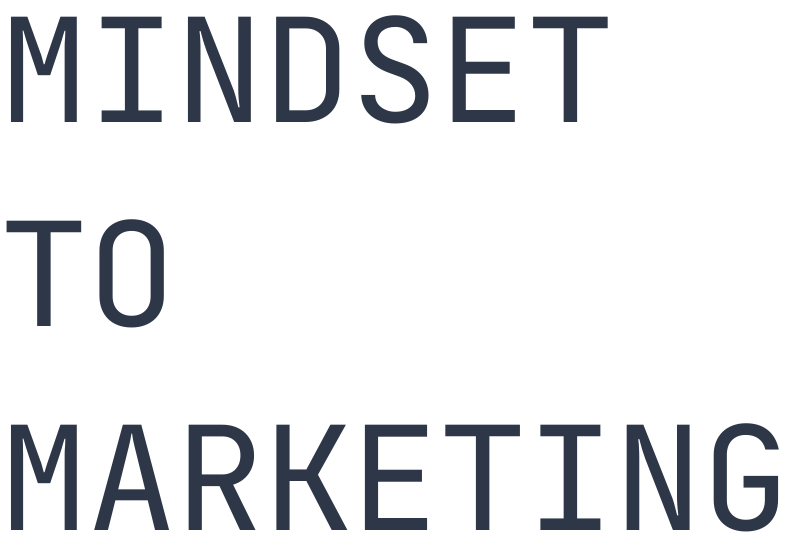I know exactly how you feel right now. You’re excited to have finally found the kind of fulfilling work that makes a real difference to people’s lives. You have this incredible passion for helping people, the only catch is that you just need some people to help.
When you look at launching your business online, the excitement starts to fade as you quickly get bombarded with options. Everyone seems to be claiming you are ‘doing it all wrong’ or you should be earning £50k a month with zero effort. And, that’s before you try to keep up with all the new AI tools available every week. The options become so overwhelming you end up getting nowhere.
It’s natural to feel lost in all the noise. I teach this stuff at a global top 40 ranked business school, and I struggle to keep up with the pace and volume of latest developments. My job is to act as a filter, blocking out the noise so you can focus on the things that move your business forward using the right tools and least amount of subscriptions. In short, the aim is to find a marketing path that you find enjoyable because if you don’t enjoy the process it becomes a chore. And, then you quit.
I have been in your shoes, struggling with my own digital business. That is why I created a straightforward framework. By answering five foundational questions, you will gain the clarity you need to ignore the noise and build a rock-solid foundation for your business. It will save you time, energy, and, most importantly, money by focusing your effort where it matters most.
The Big Mistake
The biggest mistake I see ambitious solopreneurs and coaches make, especially those 40 and over who are new to the digital world, is trying to follow the wrong recipe. In general, too much stuff, spread too thin and without getting super-sharp with the solution they provide and the messaging to support it.
When you start out, your biggest fear shouldn’t be criticism; it should be getting ignored.
The online world is saturated with conflicting advice. You have people telling you how easy it is to create a £100k business practically overnight, and I am here to tell you I am the antidote to that myth. That kind of hyper-speed success is extremely rare, usually relying on luck or a massive financial investment to “cheat the system” with paid advertising.
For the rest of us, the reality is that the digital landscape is vast and crowded. There are over a billion websites and over 5.5 billion people online daily, generating 1.1 billion pieces of content every day. When you start out, your biggest fear shouldn’t be criticism; it should be getting ignored. The sheer volume means that nearly 60% of all content gets zero engagement.
If your message is broad or unfocused, you are doing a disservice to the work you put in. Spreading yourself too thin across multiple platforms leads to skimming the surface with minimal impact, turning you into a “busy fool”. The Big Mistake is mistaking activity for progress.
Are reading this and already thinking I need some 1-to-1 help? You’re in luck, because that’s exactly what I offer. Book a slot and we can chat about exactly what help you need.
The 5-Question Framework for Clarity
The solution isn’t to try harder or do more; it’s to get crystal clear on the building blocks of your business. This framework forces you to stop focusing on the overwhelming technology and instead focus on the fundamentals: who you help, how you help them, and why they should choose you.
By answering these five questions deeply, you create the roadmap (your business plan) that allows you to navigate the digital world efficiently and with confidence. Once you have this clarity, everything falls into place. The content you create is more powerful, the platforms you choose are right for the job, and the messaging you broadcast resonates.
The goal is to pass my greatest challenge; to explain your business in one sentence. It sounds easy, but it’s not. Try it. Aim for what you do, who you help, and why it’s important, all in one sentence only.
Let’s dive deep into the five foundational questions that will transition you from feeling confused and ineffective to being able to execute the perfect ‘dinner party pitch’.

Question 1: What problem am I really solving?
This is arguably the most critical question because it anchors your entire offering.
Your lived experience is the one thing AI cannot replicate.
People don't buy "coaching"; they buy solutions to painful problems.
The common mistake I see coaches make is focusing on the process or the features. You might say, “I offer 1:1 coaching sessions over Zoom,” but that tells your client nothing about the outcome they are buying. People don’t invest in coaching sessions; they invest in the shift or the transformation they hope to achieve. Remember, they most likely don’t know that much about the coaching process anyway. So, sell the outcome, think; confidence, clarity, vitality, or a career change.
If your message focuses on the process, you will struggle to stand out, forcing you into a corner where you compete solely on price. The most successful businesses, regardless of niche, solve a real pain point that people are actively feeling and trying to fix.
"Follow your solved problem" is better advice than "follow your passion".
I advise this because your lived experience is the one thing AI cannot replicate. Your personal story is powerful. The adversity you faced, the journey you took, or the specific problem you successfully solved is unique. It creates genuine value and originality that resonates deeply with your audience. Lean into your life experience to explain your points and the benefit you offer. This approach creates unique, original content that will rank highly in the modern SEO landscape.
If you find yourself struggling here, look inwardly: What problems have you faced or overcome in your own life? What frustrations do you notice often?. By framing your business around a problem you understand deeply or have lived through, you are positioned as an empathetic guide who has already been there.
Ask yourself: What transformation am I selling?
To expand this deeply, you need to articulate your purpose and the solution you provide clearly, ideally in just two or three sentences. Ask yourself these questions:
- What need does my business meet?
- What outcomes can clients expect?
- Why is this solution important to them?
When you are clear on this, you have the nucleus of your business purpose.
When I first started out, I’ll be honest, I really didn’t buy into the whole niching thing. But, when I tried and failed, wasting months of effort with little return, I went back to the planning stage. I found that my lack of buy-in was more about my lack of real understanding. I know put niching and creating your Ideal Client Profile (ICP) at the very top of all priorities. It is the only way to avoid obscurity unless you have very deep pockets for paid marketing services.

Question 2: Who is my specific ideal client?
Once you know the problem you solve, you must define exactly who you are solving it for.
The art of niching
“I help women” is not a business plan. “I help new mums in their 40s return to the workforce” is.
This is where many coaches fear niching down, believing they are “pigeon-holing” themselves. But niching is not a prison; it is simply establishing a targeted marketing campaign. When you speak to everyone, you speak to no one.
And, there is nothing to stop you extending your range further down the line. Just land something first.
The common mistake is sticking to generic messaging. When you launch a self-branded business, lack of clarity means your potential customer won’t understand who you are or what you offer. If you are too wide in your target, you make it extremely difficult for search engines or social media algorithms to identify you as the ideal answer to a user’s query.
"Precision Marketing" makes content creation 100x easier.
Precision marketing as I call it, or finding your niche, informs everything you do. Knowing your ideal client persona (ICP) dictates the platforms you use (e.g., LinkedIn for executive coaches, Facebook for wellness coaches), the specific topics you cover, and the language you adopt.
By focusing on a specific client, you meet them at a precise point of need. For example, shifting from “marketing help for small business” to “marketing help for coaches starting an online business” dramatically increases your chances of being found. Remember, experts get paid more than generalists.
Don’t compete on price. Compete on you. Your Unique Value Proposition (UVP) is often your story + your process.
Think of the client you would be most excited to see on your calendar. Describe them in detail
Don’t just stick to the basics. Deeply flesh out their profile. You need to understand their demographics (age, location, occupation) and their psychographics (their aspirations, their fears, and their pain points). You should be asking yourself:
- Who are they talking to?
- What specific language do they use?
- Where do they hang out online?
- What are they searching for?
The answers to these questions become your raw material for content creation. You can even use AI to help define a persona, but I encourage you to think organically first and then push the AI for detail and nuance, not just accepting its first generic answer.
Figuring out your Ideal Client can be really difficult, but I assure you when you get it right it will be a breakthrough moment. You are then going to want to test if the market. Find out more from my blog Want To Do Ethical Market Research? Here’s How…
Question 3: How am I different?
With a defined problem and a specific client, the next step is standing out in that crowded space.
Competition is good; it proves there's a market. You just need to find your gap.
It is tempting to look at bigger competitors and feel disheartened, but their existence validates that there is demand. Your goal is not to copy them; it is to identify their weaknesses and fill the gap they are leaving open.
The biggest common mistake here is trying to compete on price, often charging too low because of self-doubt. If you don’t clarify your unique value, you revert to competing purely on cost, and people often won’t value your service if they perceive it as too cheap.
Don't compete on price. Compete on Value.
Your Unique Value Proposition (UVP) is often your story + your process. It is the single, clear reason why a customer should buy from you and not the competition. This definition must be specific, outcome-driven, and unique.
The most powerful element you possess is your story and your expertise. This personal foundation adds value that generic marketing cannot. As I teach, people don’t buy what you do; they buy why you do it. You need to convey your mission, your principles, and your core philosophy in a way that resonates with your ideal client.
To craft your UVP, focus on outcomes and benefits, not features. For example, instead of saying, “I offer a six-week business launch programme (feature),” you say, “I provide the roadmap to eliminate self-doubt so you can launch your business in six weeks (outcome/benefit)”. Your goal is to simplify your message until you can describe your business succinctly in a single sentence.
Your website needs a clear structure, intuitive navigation, and precise messaging.
Look at the gaps in your competitor's marketing and fill them.
Become a detective. Analyse competitors’ websites and content. Study what they offer (pricing, packages), and look for what key conversations they are missing. More valuable still: look at their one-star reviews or comments. These complaints are pure gold; they are essentially a free roadmap of pain points your business can solve.
Question 4: What is my foundational online presence?
Once you have your clarity (Who, What, Why), you need a place to host your offer that instils trust and confidence.
You don't need a £10k website, but you do need to look professional.
A common beginner mistake is trying to be everywhere at once: YouTube, LinkedIn, Instagram, a blog, and three niche sites. This causes you to spread yourself too thin, resulting in mediocrity everywhere.
The essential foundation for any solopreneur is controlling your own real estate. Your “Home Base” must be a website that you own and control, especially since platforms like X/Twitter can pull the plug at any moment. The website is an extension of you and your business, and the messaging in the hero section (above the fold) is your prime real estate to impress visitors.
My "One-Plus-One" Rule: One website + One social platform
You must start with the basics. For a beginner, a simple website created using a tool like WordPress is highly recommended, as it is the most popular content management system and is easy to use without coding experience. Your website needs a clear structure, intuitive navigation, and precise messaging. A homepage that is dedicated to the client, the problem, and the solution you provide with a useful free resource to encourage visitors to leave their email is the perfect start.
Each platform has it’s own specific wants and needs. To build success takes time and focus. Choose the channel that aligns with your skills and where your target audience is spending time (e.g., LinkedIn for thought leadership, YouTube for authority building). Consistency on that chosen platform is the key to success and growth.
Use free tools to maintain a low overhead.
You don’t need to spend money until you prove viability.
- For design: Leverage free tools like Canva to create your brand kit, including your colour palette, typography, and logo. Canva is a fantastic graphic design tool that has essentially made us all graphic designers.
- For your site: Use simple WordPress hosting or free options to manage your initial site build.
- For SEO: Use free tools like Google Trends or Reddit to figure out what people are searching for to guide your content.
Looking for a professional SEO/LLM friendly website built just the way you like it? Check out some of my recent work. I make the process easy and leave you with a website you can be proud of.
My most successful blog post came from searching for topics on Google Trends. If you can capture a moment that is connected to your niche and you build content around it, you are going to be found by a lot more people.
Your goal is to build a professional-looking business profile that is clear, linked correctly, and displays your authority.
Question 5: What is the goal & revenue model?
The final question brings your purpose and plan down to earth: What are you trying to achieve, and how are you going to pay the bills?
Let your ultimate goal guide the detail of your actions
A business plan exists primarily to provide clarity and focus to your goals. Before you create any content or plan a launch, you must know what your ultimate goal is, why you are doing it, and what success looks like. This allows you to set Key Performance Indicators (KPIs) that are congruent with the outcome you are trying to achieve.
A massive contributor to the high failure rate of online businesses (up to 90%) is often poor financial management and a non-existent or poor marketing plan. If you don’t think about the costs, your idea might be great, but it will never be profitable.

Be realistic with your targets and pricing
Be honest. Is the purpose to earn enough for a nice holiday each year or do I need to turn it into a salary? Both are valid.
You need to establish a revenue model that reflects your ambition and lifestyle. To figure out your pricing, you must consider the reality of running your business. This involves a simple calculation:
- Desired Monthly Earnings: What do you want to earn?
- Available Coaching Hours: How much time do you have available for coaching, versus the time required for business operations (marketing, sales, admin)? You must account for the reality that half your time may be spent on non-coaching tasks.
- Calculate the Rate: Divide your desired earnings by your monthly coaching hours to find a necessary hourly rate.
This calculation helps you figure out if your desired earnings are realistic given your time constraints and helps justify why you charge what you do. When you package your services, keep it simple, transparent, and logical. Are you going to sell per hour, as a series of sessions, or as a membership?
The best way to think of this is through the eyes of when you are a customer. When I decide to buy it is because I trust or like the person or product enough. In a service-based business your comfortable investment level is directly proportionate to trust you place in the vendor. For example, if you are selling a 3-month coaching package you are going to need to win trust over time as the cost will be quite high. Therefore, it could be that you offer a lower-risk, lower-ticket item for people to get to know you better first.
From Overwhelmed to Ready
If you have worked through these five questions honestly and thoroughly, you are should be feeling confident about the next steps. You have worked hard and the prize is clarity.
When you understand that every piece of content, every platform, and every hour of work is aligned with a specific client and a clear goal, the tasks become manageable. Not only that but the production is higher, giving you a better return on your time investment.
The solution is always to pause, revisit your plan, and break that big task into smaller, manageable chunks. Having this structured plan reduces stress and anxiety while maximizing efficiency.
Building an online business is a journey, not a single step. You will make mistakes, you will need to adapt, and you will learn as you go. But if you start with the foundation of these five core questions, you have armed yourself with the only tools you truly need: purpose, precision, and confidence. You are ready to execute your plan and achieve profitable, sustainable growth.
If you like my approach and want to do some further reading check out my blog How to Attract Coaching Clients Online: 5 Essential Tips
Frequently Asked Questions
How do I start my own online coaching business?
Start by establishing clarity, defining what painful problem you are solving and who your specific ideal client is. Build a plan with realistic projections of costs, number of clients and how much you will charge. Then, choose one social platform where your think your client spends time and start posting. Consistency and relevant content are key to execution.
Is online coaching profitable?
Yes, online coaching can be highly profitable, but you must be realistic, six-figure success is rare for the majority. Profitability requires setting goals and establishing a precise revenue model based on your costs and available coaching time. Focusing on a specific niche also helps increase your perceived value and pricing power.
How much does it cost to start an online coaching business?
You can start your online coaching business with very little cost since it primarily requires your time and expertise rather than upfront capital. I strongly advise leveraging free resources and tools like Canva for design or free starter plans for customer management until you prove viability. This approach helps maintain low overhead and maximizes flexibility.
Do you need a license for online coaching?
While the sources do not specify a universal license, you must fulfill core legal obligations to run your business seriously. You need to register as a sole trader, understand GDPR for handling client data, and secure professional indemnity insurance. Set up a contract or terms and conditions to clearly communicate your offer to clients.
What type of life coach is most in demand?
Instead of chasing general demand, you should focus on defining a niche to enable a precise marketing strategy that targets specific needs. Clarity is crucial because trying to appeal to everyone means you appeal to no one. Experts who solve specific, painful problems and find market gaps often command higher prices than generalists.
What are 5 common startup costs?
Five common startup costs include essential equipment like a laptop and microphone, necessary professional insurance and memberships, domain or website hosting fees, digital tool subscriptions (even free ones should be tracked), and any costs associated with marketing and sales. These must be accounted for in your overall business plan.
How can I attract clients if I have no existing audience?
You attract clients by providing original, high-quality content that addresses user intent and demonstrates expertise. Focus on mastering one platform where your client spends time, and ensure your message is clear and concise. Leveraging SEO-optimized content and using a Google Business Profile also boosts organic visibility and trust.
What tools do I need to manage session scheduling and payments?
You need tools that remove friction from the client journey, making booking and payment seamless. I suggest using an online scheduling tool linked to your calendar and a secure online payment processor like Stripe or PayPal. Ensure your system is clear, simple, and instills trust and confidence in the transaction process.






0 Comments